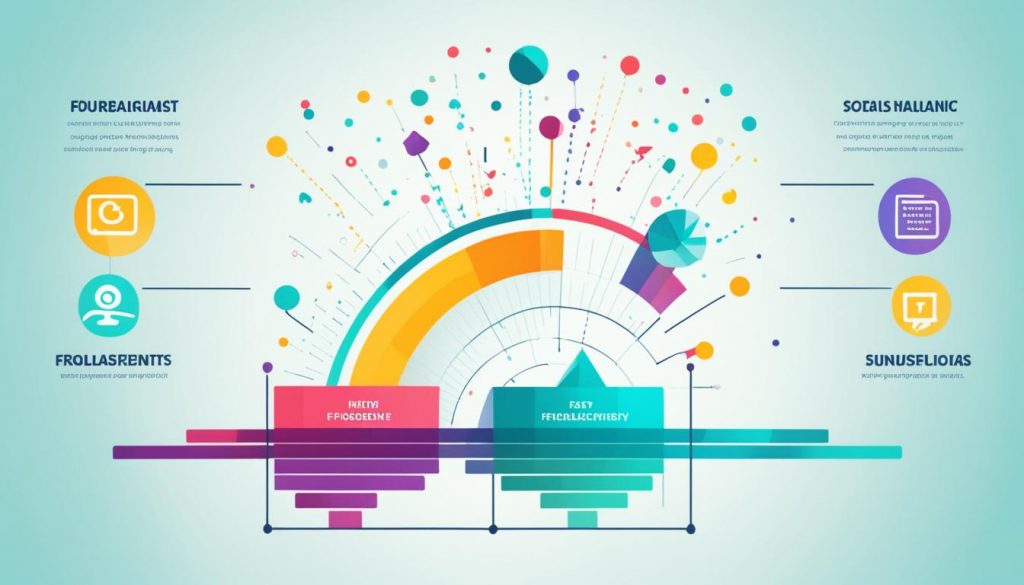Do you find yourself asking how to measure social media ROI? It’s a common question. The 2022 Sprout Social Index™ shows it’s the second major issue for social media teams. Yet, with the right strategies and tools, figuring out your social media ROI can become easy.
To measure social media ROI, start by collecting data that matches your goals. We need to look beyond basic numbers like followers and likes. It’s about focusing on real impact metrics such as how many people see your posts, interact with them, and click your links. By grasping how social media affects your main goals, you can see if it’s working and make decisions backed by data.
Sprout’s Advocacy ROI Calculator Tool can help make things easier. It looks at how your social media efforts impact things like brand recognition, finding new customers, and even hiring. This way, you get a full picture of social media’s value for your company.
Don’t get discouraged by the challenge of understanding social media ROI. With the right mindset and tools, you can confidently measure your social media’s performance. This way, you can enhance your strategies and achieve more success.
Define the purpose of social media for your brand
Understanding the goal of social media for your brand is key. It lets you tailor your efforts to best meet your needs. This way, you can make the most out of what social media has to offer.
Some brands use social media mainly to get their name out there. They want to connect with a bigger crowd and show what they’re all about. With the right approach on platforms like Instagram, Facebook, and Twitter, they can do just that. These platforms offer tools that help brands shine and make a good impression on their audience.
Other brands focus on finding potential customers through social media. They create special ads or content that make people interested. While these ads can be effective in reaching a targeted audience and generating revenue for the platforms, there is a delicate balance between effective advertising and ruining the user experience. By using smart strategies and the targeting options on these platforms, they can grow their customer list. It’s all about turning interest into leads.
No matter the aim, tracking social media’s impact is vital. This helps brands see if their work is paying off the way they want. With the right tools, they can see what’s working and what’s not. This way, they can make smarter choices about where to focus their resources.
Now, I’ll share steps to plan social media goals that you can actually keep track of. This is essential for seeing the real impact of your social media work. It helps brands do better and reach their goals more effectively.
Set actionable social goals
Measuring social media ROI starts with setting clear goals. These goals must be specific and easy to track. By doing this, you can see how well your social media is working. This also helps you make your social media better.
Think about goals like:
- Email list sign-ups
- Contact form inquiries
- Trial sign-ups
- Purchases
- Downloads of whitepapers or ebooks
These are things you can easily measure. They link directly to the success of your social media efforts. With the right targets and tracking, you’ll learn a lot about your social media’s impact. This knowledge can guide your future decisions and help your business grow.
Importance of Measurable Social Media Goals
Measurable social media goals matter for many reasons. They let you see how well your social media is performing. You can watch key numbers like sales and leads. This tells you what’s working and what needs to change.
These goals also help you show the value of social media to others. By sharing clear results, you prove that your social media strategy is a good investment. This can get support from important people in your company.
Setting goals makes sure you spend your time and money wisely. It helps you focus on what really matters to your business. This way, you get the best possible results from your social media efforts.
Always aim for goals that are easy to measure, make sense for your business, and can help you grow. Keep an eye on your progress. Use what you learn to get even better at using social media.
Measure your goals
After setting your social media goals, track how well they’re doing. Measure their performance to see if your efforts are effective. Google Analytics is a great tool for this.
Google Analytics shows you important info. It tells you about the traffic, conversions, and money your effort makes. With conversion tracking, you can see who really buys after clicking through social media.

Tracking Conversions with Google Analytics
Use Google Analytics to check social media conversions. Set up specific targets and look at reports to track how you’re doing. Filter the reports to see which social media posts make people act the most.
Imagine wanting to increase sales through social media. You can set an e-commerce goal. This lets you know how many people buy through your link and how much money they spent.
Understanding Campaign Effectiveness
Google Analytics helps you see what works. It tells you which social media efforts bring in more business. This info helps you focus on what really boosts sales or form fills.
Sometimes, a social media site might bring in a lot of clicks but few sales. Knowing this, you can tweak your strategy. This way, you can spend your time and money where it really counts.
Stay on top of your data to improve your social media impact. Making choices based on solid information leads to better outcomes.
- Use Google Analytics to track traffic, conversions, and revenue from social media.
- Set up conversion goals to measure specific actions taken by users from social media.
- Filter reports to gain insights into the effectiveness of your campaigns.
- Analyze data to identify high-performing campaigns and make informed decisions.
Track your social media expenses
Calculating social media ROI involves knowing your costs well. This means more than just ads spending. You must think about the time and work put into your social media plans. Keep track of all these costs to see how effective your strategy is.
When you track social media expenses, think about these points:
- Time spent on campaigns: Count the hours for creating and running social media ads. This includes making content, scheduling posts, watching how things go, and talking to followers.
- Content creation costs: Add up what you pay for content making or design work. This could be fees for graphic art or the cost of videos or influencers.
- Social media management software costs: Include the price of tools for managing social media. These could be for posting at the right time, checking performance, and keeping up with your accounts.
- Ad costs: Ad spending is big for social media plans. Keep track of what you spend on ads on various platforms like Facebook or Twitter.
By noting down all these spending, you’ll know your social media ROI better. This info helps you see where your money is most effective. Knowing this helps choose the best places and plans to put your efforts into.
To figure out your social media ROI, use this formula:
Remember, keeping an eye on your social media expenses is constant work. As you make your strategies better and use resources smarter, always update your calculations. This keeps your ROI info accurate.
Tips for improving your social ROI
Want to boost your social media ROI? Start by focusing on how often you post. Posting regularly makes your brand more visible and keeps your audience engaged. Try different posting schedules to see what works best for your audience and aligns with your goals.
Improving your ad campaigns is another great way to boost social media ROI. Look at your ads’ performance and make changes based on what the data tells you. This way, you can make your paid campaigns more effective without spending more money.
Experimenting with your content can also lead to a better social ROI. Try different types of posts, like videos, images, and infographics. You could also tweak your messages, calls-to-action, and who you target. This fine-tuning can make your posts more successful.
Keeping an eye on what your competitors are doing is smart, too. See what strategies are working for them. Then, adapt these strategies to fill in any gaps in your own social media plan.
To sum up, getting a better social ROI is all about finding the right posting schedule, refining your ads, and experimenting with your content. Don’t forget to keep an eye on your competitors. By following these tips, you can make your social media efforts pay off more for your business.

Optimize Posting Frequency
Posting often on social media is key to a better ROI. It boosts your visibility and keeps your audience engaged. Find the best posting schedule by testing different options.
Refine Ad Campaigns
Making your ad campaigns better is crucial for a higher social media ROI. Review your ads’ performance and make changes based on data. Keep adjusting your campaigns with analytics to get the most out of your budget.
Test Different Content Factors
Try out various content types and strategies to see what works well. This could include testing different media types, messages, and CTAs. Use analytics to understand what your audience likes and tweak your approach as needed.
Track Competitor Campaigns
Watching what your competitors do can give you ideas for improvement. Learn from their successful strategies and apply them wisely. By focusing on their content and engagement, you can enhance your own social media plan.
What is social media ROI and why does it matter?
Social media ROI stands for Return on Investment. It measures the value businesses get from their social media efforts. It checks if the benefits outweigh the costs.
Knowing the ROI helps marketers show value, share results, and make better choices for their tactics.
It’s key for using budgets wisely. It shows the worth of social media projects. This makes it easier to justify spending and use resources well.
Also, ROI data is a strong way to talk to stakeholders and bosses. Showing real results can win their support. It builds trust and keeps them investing in social media.
Measuring ROI guides smarter choices. Marketers learn from what’s effective and what’s not. This feedback is gold for tweaking and improving their social media plans.
In short, ROI is critical. It offers a clear way to see social media’s value. It helps marketers and businesses do better by their actions online.
How to calculate ROI on social media in 5 steps
Calculating social media ROI helps businesses know if their efforts are working. It’s key to making smart choices. Brands learn to measure, adjust, and show the value of social media to everyone involved.
Step 1: Define Clear Social and Business Objectives
The first step is setting clear goals for social media. These goals should help overall business aims, such as growing brand awareness or increasing sales. Knowing what you want makes it easier to see how well you’re doing.
Step 2: Track Metrics that Align with Your Objectives
Next, choose the measurements that match your goals. This could be things like how many people see your posts or how many buy your product. Tracking these lets you check if you’re moving towards your goals.
Step 3: Calculate Social Media Costs
Now consider the costs of your social media work. This is everything from ads to the time spent posting. Counting these costs is crucial for finding your true ROI.
Step 4: Use the ROI Formula to Calculate ROI
With goals, metrics, and costs in mind, it’s time to use the ROI formula:
ROI = (Net Profit / Social Media Costs) x 100
Net profit is your social media revenue after taking out costs. This formula shows your return on investment in a percentage.
Step 5: Create a Report Demonstrating the Impact of Social Media Efforts
Lastly, make a report that highlights your social media’s success. Include your ROI and other key findings. Use charts or graphs to make the data clear.
Customize your metrics and goals to fit your business. Following these steps helps measure social media ROI well. It guides better decisions and strategy improvements.
Conclusion
Understanding social media ROI is key for businesses. It lets them check how well their social media work is doing. By measuring and working to improve ROI, companies can do better on social media. They can also show its value to those looking in. Using the right tools and tactics, they can get a clear view and keep progressing.
Social media ROI is more than likes or followers for businesses. It shows how social media affects their main goals. Setting goals, watching how you do, and studying the results gives valuable info. This info helps businesses see if their social media is really working.
So, social media ROI is a way to see the value of social media work. Knowing this helps businesses spend their money and time better. They can choose what to do to boost their social media. By always checking and improving ROI, companies really use social media well for marketing.
